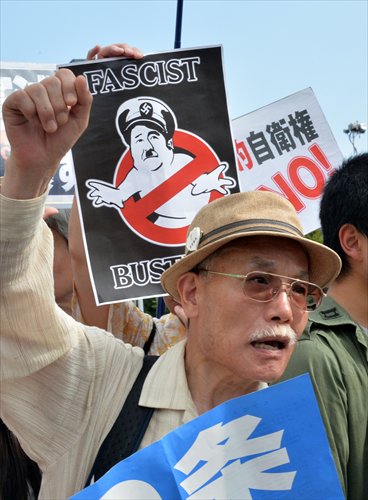Tokyo eases ban on use of force
Thousands rally in protest against Peace Constitution shift

Protesters shout anti-Abe government slogans during a rally in front of the prime minister's official residence in Tokyo on Tuesday. Photo: AFP
Read more in Daily Special: Japan’s Cabinet seeks to drop ban on collective self-defense amid protests
A major overhaul of Japan's defense policy Tuesday drew strong criticism from both China and Japanese citizens, after the decision opened the way for the country's military to engage in combat overseas.
The cabinet of Prime Minister Shinzo Abe Tuesday morning adopted a resolution to reinterpret Article 9 of Japan's Peace Constitution, which will allow the country to defend allies under armed attack in collective self-defense, reported Kyodo News.
The new policy drew an immediate response from China, with the foreign ministry questioning whether Japan is shifting away from its peaceful development path.
"We urge the Japanese side to earnestly respect the legitimate security concerns of its Asian neighbors, deal with relevant issues with discretion, not to harm the national sovereignty and security interests of China and not to undermine regional peace and stability," said Hong Lei, China's foreign ministry spokesperson Tuesday.
The move also drew public resistance in Japan, where a man protested Sunday by setting himself alight.
A poll by the Mainichi Shimbun newspaper Sunday found 58 percent of respondents were against the overhaul, while only 32 percent supported it.
In Tokyo, thousands of protesters, including politicians and ordinary people, held a rally near the prime minister's office on Tuesday, voicing their discontent over the decision.
Protesters voiced their opposition and held banners aloft, with slogans such as "Against war," "Don't send young people to battlefields" and "Safeguarding Article 9 of Constitution."
"The pacifist constitution was enacted based on Japan's reflection on its [WWII] invasion, which killed tens of millions. One of the major reflections about the invasion was the disregard of parliament back then. However, Abe is doing the same thing by using a cabinet resolution to relax the limit on collective self-defense. It is contempt for the parliament and people's voices," Kondo Shoichi, a member of the lower house from the opposition Democratic Party of Japan, told the rally.
His speech was greeted by applause.
A middle-aged man from Ibaraki, who took a two-hour train ride to join the rally, told the Global Times that the consensus since World War II has been that Japan should rely on its pacifist constitution to protect its citizens instead of on military strength.
"The constitution stipulates that Japan shouldn't maintain armed forces and outlaws waging war. Abe made this move during the 60th anniversary of the establishment of Japan's Self-Defense Force (SDF). The Japanese people will not allow it," he said.
In order to rally support for the reinterpretation, Abe has cited new security challenges in the region, namely its dispute with China in the East China Sea and the threat from North Korean missiles.
"We oppose Japan's fabrication of the so-called China threat so as to serve its domestic political agenda," Hong said Tuesday.
"Ironically, Japanese people seem to fear Abe more than they fear China," Jeff Kingston, director of Asian Studies at Temple University Japan Campus, told the Global Times in a telephone interview. "Many people think that Abe is threatening Japan's democracy, and that's more of a threat to them than the possibility of a conflict with China."
The analyst also noted that a major fear for Japanese is being dragged into a US-led conflict.
In response to such concerns, Abe told a press conference Tuesday that the country would not join in any overseas military conflicts such as those in Afghanistan or Iraq.
Japanese Defence Minister Itsunori Onodera said Tuesday that the resolution also relaxes limits on "gray zone" incidents short of full-scale war, Reuters reported.
Over the past year, Tokyo has referred to patrols of Chinese law enforcement vessels in the waters of the Diaoyu Islands and the hypothetical scenario of Chinese military personnel, disguised as fishermen, landing on the disputed islets as "gray zone" incidents.
Hu Lingyuan, a professor with the Center for Japanese Studies at Fudan University in Shanghai, told the Global Times that the reinterpretation could allow preemptive actions by the SDF.
"It is ambiguous what measures will be taken in response to such scenarios, but it raises the risks of a clash between China and Japan over the islets."
The move toward collective-self defense, which will be exercised to protect allies, primarily the US, was welcomed by Washington, as analysts say it serves the interests of the US pivot to Asia.
"For the US, the first step is that Japan now has destroyed Article 9, so it helps down the road that Japan will upgrade its military, and is helping to promote containment of China," said Kingston.
As US influence declines in Asia, it encourages Japan to play a proactive role and shoulder parts of Washington's responsibilities so as to alleviate its burden, said Wang Yiwei, a professor of international studies at the Renmin University of China.